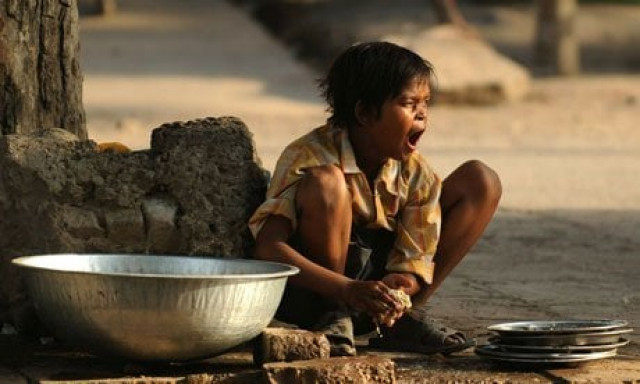Legislation unable to impede child labour
With the government silent about the situation, exploiters continue to exploit the most vulnerable segment

In August of 2020, Pakistan decided to ban child domestic labour, passing an amendment that made it illegal for children to be forced into domestic work, in addition to other forms of grueling labour. However, despite the landmark ruling, over 3.3 million children in the country still remain trapped in child labour, deprived of their childhood, health, and education, and sentenced to a life of poverty.
Karachi, which is the country’s financial capital and the largest urban metropolis, is where this crime continues to take place in plain sight. The government remains silent about the situation and exploiters continue to exploit the most vulnerable segment.
“Everyone here knows child labour is a crime, so no one forcefully employs children anymore,” said Ustad Yasin, a motorcycle mechanic based in Burnes Road. His shop is one of the many workshops in the area, that are involved in training children as young as eight-years-old in the skill of motorcycle repair.
“The children working here come from the most impoverished households. They cannot afford education; neither do they want to be educated. Their primary concern is earning money, for which their own parents have trained them and sent them here to polish their skill,” he told.
According to the mechanic, while education remains expensive and inaccessible, the parents who send their children to workshops believe that they will be able to secure a better future for themselves upon polishing their craft while also contributing to the household expenditure at the same time- something that they cannot do if they are admitted in a school.
“However, this is not as shocking as it seems. It’s simply the reality of our poorest segments, where everyone in a household is expected to offer a working hand and carry their weight. It is a means of sustenance for these families and there is not much that the government can do but shut its eyes because it has no welfare programmes to offer as an alternative,” the mechanic expressed.
Ten-year-old Abdul Jabbar is one of the few apprentices employed by Yasin. Like his fellow apprentices, Jabbar dreams of being a mechanic one day and opening his own workshop, which he believes would draw his family out of the poverty cycle they are trapped in. “We have 10 people in our house and my father is merely a rickshaw driver. He has no money to send us to school, so I come to the market along with my brothers to learn manual labour skills instead. I make Rs200 a day at the workshop, while also getting to learn the skills so that I can be a good mechanic one day,” the child told.
Similarly Ahmad Khan, a 15-year old teaboy at a local dhaba, also finds himself working 12-hours a day for a salary of Rs400. “The money I bring home feeds my family. If I stopped working at the dhaba and instead started going to school, who is going to pay my school fee and more importantly, who is going to put food on our table?” the teaboy commented, when asked if he wishes to quit working and go to school.
Speaking in this regard, Social leader Haji Ahmad Tayyab said that while the government has made it a crime for minors to work, but in order to solve the problem of child labour it needs to also work towards bettering economic conditions so that no child is required to work in the first place. “For this, the government needs to formulate a comprehensive welfare programme to provide these children with vocational education so that they can support their families in the future, while remaining out of the clutches of child labour,” he asserted.
Identifying with Tayyab’s statement, Sindh Child Protection Authority Chairperson Shamim Mumtaz said that the government acknowledges the severity of the matter, and is in the works of creating further legislation to eliminate child labour from the province. “We are endeavoring to open more shelter homes for children while taking concrete steps to reprimand anyone involved in forcing children into child labour,” he told The Express Tribune.
Published in The Express Tribune, January 14th, 2022.



















COMMENTS
Comments are moderated and generally will be posted if they are on-topic and not abusive.
For more information, please see our Comments FAQ